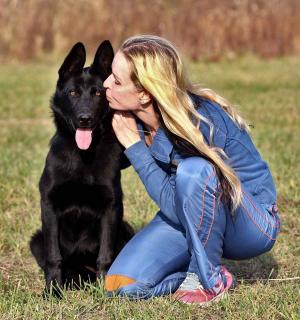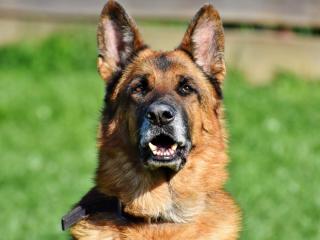

The German Shepherd wins hearts as a highly adaptable dog. It excels in roles ranging from guardian and military helper to tracker and companion, even dabbling succefully in acting. This smart dog can switch roles with ease.But be warned! This strong-willed dog needs consistent and firm training to become obedient and balanced. Let’s explore the main traits and essential needs of a German Shepherd.
In Germany, farmers employed various types of sheepdogs to herd and protect livestock. Captain Max Von Stephanitz had a vision in the late 19th century. He yearned for a breed embodying the skills of these diverse sheepdogs.
Armed with determination, he set a precise breeding and selection program in motion. His goal was to breed a versatile dog that can both guard flocks and its family while being a top-tier pet. He led breeders with a systematic approach. He made sure the breeding dogs possessed a sound temperament, a keen working instinct, and a robust constitution, making them suited for a variety of tasks.
The German Shepherd made its first show appearance in 1892. The breed’s club was established in 1899, and in the same year, they published the first standard.
Weight:
Coat: short, dense, harsh, and straight with a very thick undercoat. Neck hair and trimmings (under the body, legs, and tail) are longer.
Color: black and tan. Black with shades of brown, red, cream, and light gray.
Life expectancy: 10 to 12 years.
 Loyal, lively, and of exceptional intelligence, he needs a reference master. This person must educate him rigorously and consistently to build a trusting relationship. When properly socialized and well-educated, the German shepherd is a fantastic life companion. He is a single-owner dog, always looking to please his master.
Loyal, lively, and of exceptional intelligence, he needs a reference master. This person must educate him rigorously and consistently to build a trusting relationship. When properly socialized and well-educated, the German shepherd is a fantastic life companion. He is a single-owner dog, always looking to please his master.Though the German shepherd boasts of a robust health, it’s predisposed to certain illnesses:
During the two seasonal shedding periods, daily brushing becomes a must to remove dead hair. Outside these times, a weekly brushing will do. As with all dogs, it’s crucial to maintain their ears, eyes, teeth, and keep those nails at just the right length.
 here are specific kibbles for the German shepherd, tailored to meet the needs of this large breed dog.
here are specific kibbles for the German shepherd, tailored to meet the needs of this large breed dog.The average price for a German shepherd ranges between 700 and 1500 dollars/euros. Sturdy as they are, their main monthly expense will be food, about 60 dollars/euros for specific German shepherd kibbles.
Keep a special eye on the length of the dewclaw in German shepherds. Since it doesn’t touch the ground when the dog walks, it won’t wear down naturally.